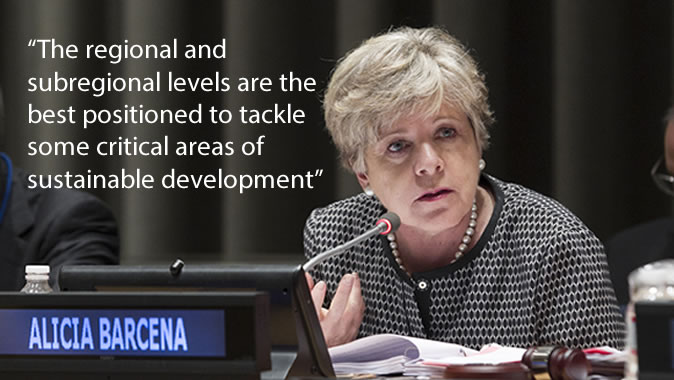UN Regional Commissions Have a Key Role in Facilitating Implementation and Follow-up of the 2030 Agenda
ECLAC’s Executive Secretary, Alicia Bárcena, participated in a debate organized by the Economic and Social Council (ECOSOC) in New York.

The United Nations regional commissions constitute an optimal mechanism for offering countries timely and effective advice on policies for implementing the 2030 Agenda for Sustainable Development and on tools to facilitate its follow-up, the Executive Secretary of the Economic Commission for Latin America and the Caribbean (ECLAC), Alicia Bárcena, said in New York.
The senior international official participated on behalf of the five regional commissions of the United Nations (UN) in a discussion panel focused on strengthening institutional collaboration at the national, subregional and regional levels, in the framework of the sessions on the activities of the UN development system that the Economic and Social Council (ECOSOC) is holding from February 22 to 24 at its headquarters in New York.
Bárcena highlighted that the commissions—the United Nations System’s only intergovernmental organizations at a regional level—are fundamental institutions for fomenting innovative thinking and forging consensus regionally. They work effectively and flexibly to provide advice on the public policies that are part of the economic, social and environmental pillars of development, according to the specificity of each country. For that reason they stay in constant and direct contact with the authorities of their Member States, while also promoting regional dialogue.
“We believe that the regional and subregional levels are the best positioned to tackle some critical areas of sustainable development and thereby provide frameworks for action by governments, the private sector and civil society. We can help actors think about how to uphold the priorities of sustainable development even in recessive contexts, such as the one that developing countries face currently,” Bárcena said.
ECLAC’s Executive Secretary identified various key pillars: the strengthening of the regional architecture for follow-up on the 2030 Agenda through Regional Forums on Sustainable Development; the incorporation of the Sustainable Development Goals (SDGs) in national development plans and public administration mechanisms such as budgetary and taxation systems; the strengthening of statistical capacities in the context of the data revolution to facilitate the follow-up on the indicators associated with the SDGs using traditional and non-traditional data that is ever more disaggregated and georeferenced; the analysis of the critical means of implementation in each regional context to support the mobilization of financial mechanisms to implement the Agenda; and the use of science, technology and innovation to facilitate the transition to patterns of production and consumption that are more sustainable and knowledge-intensive.
ECLAC’s Executive Secretary also emphasized that the commissions have intergovernmental subsidiary bodies, dedicated to specific themes such as statistics, demographics, planning or gender issues. These will be complemented by the regional forums on sustainable development (that are being convoked by the regional commissions along with other partners), which will serve as platforms for the follow-up and implementation of the 2030 Agenda and will allow for key inputs to be produced for the High-level Political Forum on Sustainable Development that is organized each year by the UN.
As Bárcena recalled, the commissions also work in collaboration with other UN bodies and especially with agencies, funds and specialized programs through the Regional Coordination Mechanism, as well as with other regional and subregional organizations and with various development banks. In addition, they provide assistance to respond to problems that are specific to the least advanced countries, middle-income countries, landlocked developing countries, and Small Island Developing States.
Alicia Bárcena also touted the commissions’ ability to build consensus at a regional level ahead of negotiations that are carried out later in the global arena.
As an example, she cited the work of the Economic Commission for Africa (ECA) to establish a shared African vision regarding the 2030 Agenda, and the efforts by ECLAC’s Statistical Conference of the Americas to generate regional takes on the SDG indicators and identify needs for strengthening their capacities. She also cited the environmental conventions of the Economic Commission for Europe (UNECE) and the transportation conventions of the UNECE, the Economic and Social Commission for Asia and the Pacific (ESCAP) and the Economic and Social Commission for Western Asia (ESCWA).
“The regional architecture and the role of the regional commissions must be fully reflected in the ECOSOC’s mechanisms and in the discussions surrounding the Quadrennial Comprehensive Policy Review (QCPR),” Bárcena stated.
The panel in which Alicia Bárcena participated on Tuesday 23 February was moderated by David Nabarro, the Special Adviser to the UN Secretary-General on the 2030 Agenda for Sustainable Development, and the main presenter was Rossana Guevara, the Vice President of Honduras. Other panelists included Sahar Nasr, Egypt’s Minister of International Cooperation; Mike Kelleher, a representative of the World Bank’s Senior Vice President’s Office for the 2030 Development Agenda, United Nations Relations, and Partnerships; and Nardos Bekele-Thomas, Director of the Office of the Chef de Cabinet of the Secretary-General.
Related content
12th meeting of the operational activities for development segment of the Economic and Social Council (ECOSOC)
Remarks by Alicia Bárcena, Executive Secretary of ECLAC.
Contact
Public Information Unit
- prensa@cepal.org
- (56 2) 2210 2040